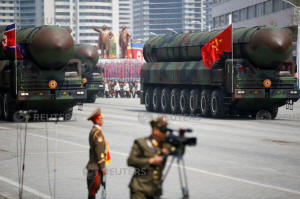|
'Treasured sword': North Korea seen as
reliant as ever on nuclear arsenal as talks stall
 Send a link to a friend
Send a link to a friend
 [November 13, 2018]
By Josh Smith [November 13, 2018]
By Josh Smith
SEOUL (Reuters) - Amid signs that
negotiations between North Korea and the U.S. are stalling, analysts say
Pyongyang still sees its nuclear arsenal as a key tool in securing its
national safety and winning concessions from international rivals.
Just as the United States has doubled down on its sanctions on
Pyongyang, North Korean leader Kim Jong Un has not retreated from his
pledge to expand his operational force of nuclear bombs and ballistic
missiles, increasing his leverage under any still-elusive
denuclearization deal.
A U.S. think tank said on Monday it had identified at least 13 of an
estimated 20 active, undeclared missile bases inside North Korea,
underscoring the challenge for American negotiators hoping to persuade
Kim to give up his weapons programs.
As time goes by, North Korea's likely expansion of its arsenal could
force Washington to rethink its insistence on full denuclearization,
said Moon Hong-sik, a research fellow at the Institute for National
Security Strategy in Seoul.

"This is the choice the United States has to make: whether they keep
pursuing the ideal of 'complete, verifiable, irreversible
denuclearization,' or take this dilemma into consideration and make a
compromise for limited denuclearization," he said.
U.S. President Donald Trump met Kim at an unprecedented summit in
Singapore in June where they agreed to "work toward complete
denuclearization of the Korean Peninsula.
But with scant sign of progress on negotiations since and recent
high-level meetings canceled, Trump said last week he's now in "no rush"
and still wants to meet with Kim for a second time.
U.S. officials have said sanctions forced North Korea to the negotiating
table and vowed to keep pressure until complete denuclearization. But
North Korea has credited its nuclear and missile breakthroughs for
providing it the standing to meet the world's largest powers.
Kim's own words suggest Pyongyang will continue with production and
development of the nuclear program even as it negotiates with Washington
on denuclearization, experts say.
"In the 2018 New Year address, Kim Jong Un called for shifting to
full-scale production and deployment of nuclear weapons and missiles,"
said Joshua Pollack, a senior research associate at the U.S.-based James
Martin Center for Nonproliferation Studies (CNS).
"He's never said or done anything since then to contradict that."
North Korea has not tested a nuclear bomb or ballistic missile since
last year, and has said it has shuttered its main nuclear test site with
plans to dismantle several more facilities.
North Korea recently warned, however, it could restart its nuclear
program if the United States does not drop its campaign of “maximum
pressure” and sanctions.
"NORTH KOREA NEVER PROMISED"
Monday's report by the Washington, D.C.-based Center for Strategic and
International Studies (CSIS), sparked media coverage calling it a "great
deception" by the North Koreans.
[to top of second column]
|

Intercontinental ballistic missiles (ICBM) are driven past the stand
with North Korean leader Kim Jong Un and other high ranking
officials during a military parade marking the 105th birth
anniversary of country's founding father Kim Il Sung, in Pyongyang
April 15, 2017. REUTERS/Damir Sagolj/File Photo

But South Korea's presidential Blue House said without an actual
deal to violate, Pyongyang has broken no promises.
"North Korea has never promised to shut down this missile base,"
Blue House spokesman Kim Eui-kyeom said. "It has never signed any
agreement, any negotiation that makes shutting down missile bases
mandatory... the fact that such a missile base exists shows the
necessity for negotiations to be achieved quickly."
Asked about the report, Trump's national security adviser John
Bolton told reporters in Singapore on Tuesday that Trump "has given
North Korea an incredible opportunity to walk through a door to a
different future if they denuclearize...but they still need to do
that."
The activity at the missile bases is one of several examples why
American officials may be reluctant to lift any sanctions, said Shin
Beom-chul, director of the Center for Security and Unification at
Seoul's Asan Institute for Policy Studies.
"In short, from the CSIS report we can infer that first, North Korea
is not sincere enough with negotiating and second, there’s no change
in their nuclear capacity," he said.
U.S. officials have discussed possible clandestine enrichment sites
for nuclear fuel, and in July, analysts at CNS used commercial
satellite imagery to conclude that North Korea was "completing a
major expansion of an important factory for producing solid rocket
motors for... nuclear-armed missiles".
In April, ahead of his meeting with Trump, Kim told a gathering of
ruling party leadership the nuclear arsenal represented a "great
victory" and announced there was no need for further tests of
nuclear weapons or ballistic missiles.

In the speech, however, Kim also hinted at nuclear weapons playing
an important role long into the future, calling them a "powerful
treasured sword for defending peace" that would "reliably guarantee"
a dignified and happy life for generations of North Koreans.
"Note the description of nuclear weapons as the only firm security
assurance," Pollack said. "They are not seeking any 'security
assurance' other than the indefinite possession of nuclear weapons."
(Additional reporting by Jeongmin Kim and Joyce Lee in Seoul and
John Geddie in Singapore. Editing by Lincoln Feast)
[© 2018 Thomson Reuters. All rights
reserved.]
Copyright 2018 Reuters. All rights reserved. This material may not be published,
broadcast, rewritten or redistributed.
Thompson Reuters is solely responsible for this content. |